Revolutionary-dyeing-process – Nylon66-chip 24-05-2022 - Arhive
Revolutionary-dyeing-process – Nylon66-chip
-PSF supply tightness eased: better or tougher in Jun?
Direct-spun PSF supply tightened suddenly in early May due to the outbreak of the pandemic in Jiangyin, followed by quick rise of price, widened spread and fast reduction of inventory.
Later on, some PSF plants restarted successively, and by mid-May, the operating rate of direct-spun PSF improved by about 9% points from the lowest, despite still year’s low level.
Besides, the restriction on logistics in Jiangyin was also eased, and direct-spun PSF supply increased gradually. Then PSF spread got compressed and the basis also started to weaken.
Recently, direct-spun PSF mainly moved along with polyester feedstock. Polyester yarn market has not seen much improvement yet. Since the beginning of 2022, cotton yarn production has been partly shifted into polyester/cotton yarn, and polyester/cotton yarn partly into polyester yarn, but the soft end-user demand could not make the excessive polyester yarn and polyester/cotton yarn digested. As a result, the profits of polyester yarn and polyester/cotton yarn were contracted to breakeven line or even to negative side.
At present, direct-spun PSF price stays at high level and downstream spinners mostly purchased for rigid demand. In Jun, direct-spun PSF supply is expected to increase further as PSF plants in Jiangyin restart after the lockdown and Xinfengming will start up 300kt/yr direct-spun PSF unit in end-May.
However, the recovery of the demand is largely uncertain. Thus, direct-spun PSF supply is likely to recover more quickly than the demand and PSF plants are suggested to continue the proper control of run rates.
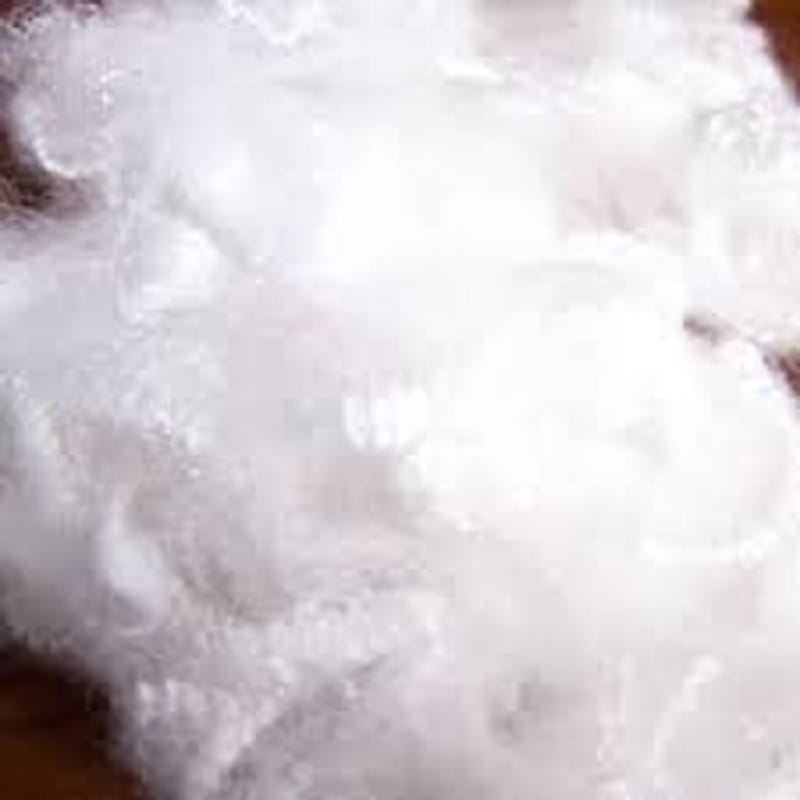
A ground-breaking project to develop a new polyester dyeing technology has beaten more than 240 projects in a competition to win a share of the Circular Future Fund.
The prize will allow Leeds researchers to further explore the creation of a circular economy for polyester and the ability to recycle it, as well as assessing the economic and environmental benefits of what has been dubbed the “polyester-infinity loop”.
The Circular Future Fund is an initiative run by John Lewis Partnership in partnership with environmental charity Hubbub. Each year the fund awards £1 million to pioneering projects that are working to create a circular economy – one which eliminates waste and pollution, circulates products and materials, and regenerates nature. Revolutionary-dyeing-process – Nylon66-chip
Polyester, which is usually derived from petroleum, is the world’s most consumed textile fibre, yet recycled polyester only contributes to 15% of total production, almost all of which is made from plastic bottles.
A major barrier to recycling polyester fabric is the presence of dyes, which makes fibre-to-fibre recycling almost impossible.
Researchers at Leeds Institute of Textiles and Colour (LITAC), in collaboration with the Wolfson CO2 Laboratory in the School of Chemistry, are developing a solution that uses new technology to deploy carbon dioxide and separate dyes from fibre, enabling easier recycling of the polyester
Currently, recycled polyester (rPET) is not based on end-of-life-clothing, but on mechanically recycled polyester from plastic bottles. This new CO2 technology will enable fibre-to-fibre recycling, creating a truly circular process.
Richard Blackburn, Professor of Sustainable Materials in the School of Design, said: “This award from the Circular Future Fund will allow us to take a significant next step in tackling the global environmental and economic issue of polyester recycling.
“Polyester is the global clothing industry’s most consumed fibre, yet fibre-to-fibre recycling for the material is unfeasible because of the chemicals involved in the dyeing process. In order to meet the UN’s Sustainable Development Goal of recycling 90% of PET plastic by 2030, chemical recycling – and specifically fibre-to-fibre recycling – is essential.”
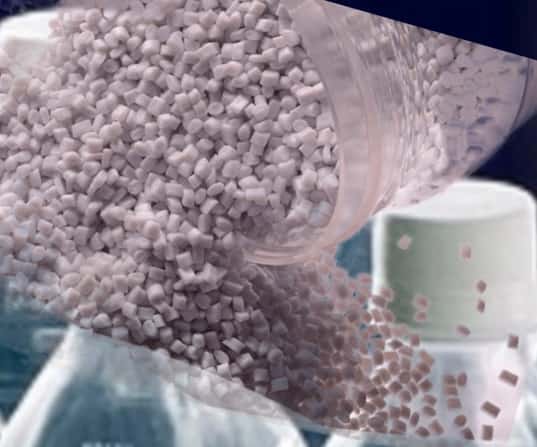
-China’s nylon 66 chip price drops to 1.5-year lowest
Nylon 66 chip price has extended almost non-stop decline after 2022 Chinese Spring Festival, and the drop in April has broken previously forecasted technical resistance line 30,000yuan/mt. On April 27, 2022, the prevailing spot price index of general-plastic-grade nylon 66 polymer has fallen to 26,500yuan/mt by Apr 11, with a year-to-date decline of 10,000yuan/mt, or a downward ratio of 27.4%.
The first round of sharp decline was during late February to early March, under a mixed pressure from both demand and supply side. This time, the sudden supply glut from a trading company was the most important reason.
During Mar 10 to Apr 11, the decline in nylon 66 market slowed down, but at the same time, its peer product nylon 6 chip market was almost steady with narrow rebounds even. Revolutionary-dyeing-process – Nylon66-chip
The most recent sharp decline appeared this week (starting Apr 22 2022), as price fell by 2,000yuan/mt in just 4 trading days.
Sharp decline, nylon 66 polymer profit comparison and future trend
On demand side, downstream modified plastic plants only saw mediocre order taking; demand from high-viscosity cord fabric plants was weakening evidently in the first quarter, and burdened nylon 66 market evidently. To tell from end users’ market, under the impact of the pandemic, automobile and electronics market performance was weak, and this gave a negative feedback toward nylon 66 industrial chain as a whole.
On supply side, firstly there was a sudden supply glut as a Chinese trader imported a large number of adiponitrile and assigned Chinese nylon 66 manufacturers and sold polymer at much lower rate to the spot; worse influence was rooted in suppliers worry of an outbreak in feedstock ADN and HMDA supply, which would lead to significant increase in nylon 66 polymer. As the supply of ADN and HMDA had been almost dominated by limited import sources for all the years since the beginning of this industry in China, nylon 66 polymer production was under this restrict. Once feedstock bottleneck is lifted out, it is not difficult to see a significant rise this industry, and its price gap with nylon 6 and other chemical materials will be narrowed down substantially. Tianchen Qixiang’s startup of its HMDA plant in end-March was a solid proof to insiders’ concern.
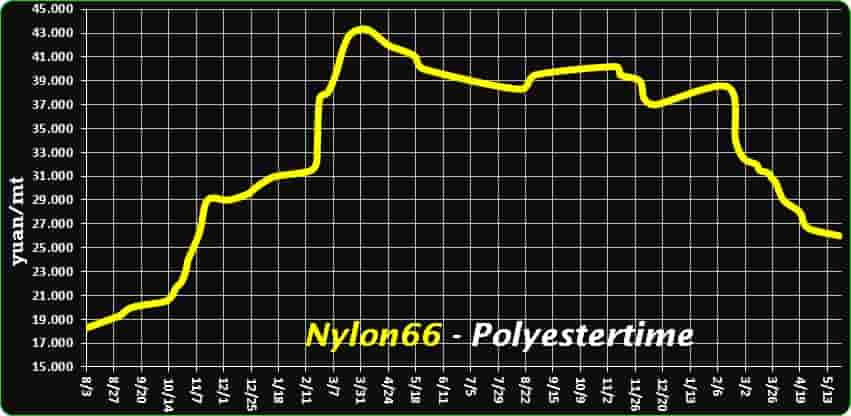
-SIMA hails removal of anti-dumping duty on spandex yarn
The Southern India Mills’ Association (SIMA) on Sunday thanked Prime Minister Narendra Modi, Union Finance Minister Nirmala Sitharaman and Union Textile Minister Piyush Goyal for removing the anti-dumping duty on elastomeric filament yarn.
The Southern India Mills’ Association (SIMA) on Sunday thanked Prime Minister Narendra Modi, Union Finance Minister Nirmala Sitharaman and Union Textile Minister Piyush Goyal for removing the anti-dumping duty on elastomeric filament yarn. The usage of elastomeric filament yarn in dress materials, including denim, enhances the value addition considerably and opens up opportunities to increase exports, SIMA Chairman Ravi Sam said in a statement here. Revolutionary-dyeing-process – Nylon66-chip
The removal of duties would create a level-playing field for the Indian textile industry in the international market and also enable it to import high quality elastomeric filament yarns that are not manufactured in India at a competitive rate, Ravi Sam added. The central government led by PM Modi has brought in several historic reforms apart from taking various bold and pro-active policy initiatives to make ‘Atmanirbhar Bharat’ a reality and turn India into a highly competitive manufacturer on a global scale, he further said.
The government had already removed the anti-dumping duty on most man-made fibres and their raw materials, including acrylic fibres, and now the elastomeric filament yarn is also exempt, the SIMA chairman pointed out. Ravi Sam also welcomed the timely decision of reducing excise duty on petrol by Rs 8 per litre and on diesel by Rs 6 per litre that would greatly help the textiles and clothing industry to reduce the transport cost as different manufacturing segments in the value chain are scattered across the nation.
Stating that the textile industry has already been facing a crisis owing to the skyrocketing cotton prices, the SIMA chairman thanked the government for removing the 11 per cent import duty on cotton.
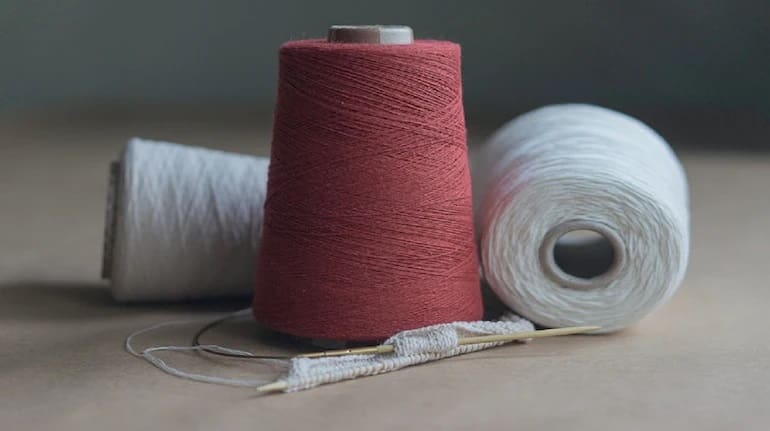
-Modern Syntex coming to feed into major demand for synthetic yarns
Modern Syntex has stepped up with a big investment in manufacturing polyester and synthetic yarns to fit the bill for global consumers switching from cotton to manmade fabrics.
The factory, being developed on 20 acres of land in Bangabandhu Shilpa Nagar, has so far made 90% progress in its work.
It has invested $131 million to produce four types of products, such as polyester draw textured yarn (DTY), polyester fully drawn yarn (FDY), polyester staple fibre (PSF), polyethylene terephthalate (PET) chips, to provide backward support to readymade garment, footwear and vehicle-making industries.
Currently, Bangladesh depends on imports of such raw materials from China, Indonesia, Korea and India etc. Revolutionary-dyeing-process – Nylon66-chip
Company officials claimed that once the factory goes into operation in March-April 2023, it will have capacity to meet a major portion of local demand for synthetic and polyester fibres and yarns.
“We will meet 60-70% of demand with our products manufactured,” Abu Sufian Chowdhury, managing director of Modern Syntex, told The Business Standard.
Apparel entrepreneurs say Bangladesh has opportunities to enhance its stake in non-cotton apparel items in the global market. So, they are now investing to increase their capacity of manufacturing such products.
If synthetic yarns and fabrics can be sourced locally, it will be instrumental in saving foreign exchange and extra time needed to import from foreign countries.
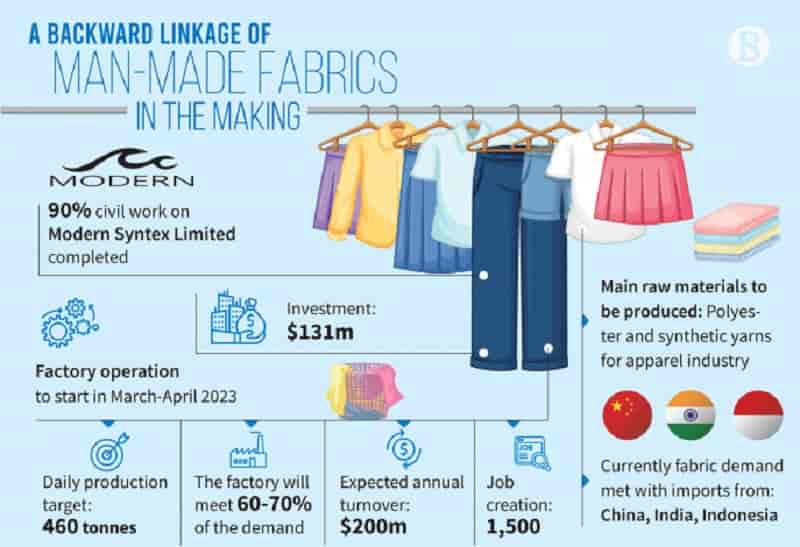
-Textile recycling tech startup triumphs in Circularity 22’s Accelerate competition
On GreenBiz Group’s Circularity 22 main stage this week in Atlanta, GA, four startups from across the circular economy landscape competed for the sold-out crowd’s votes to win Accelerate, the annual fast-pitch competition. Two industry experts, Francesca Whitehead, investor at G2VP, and April Crow, vice president at Circulate Capital, also provided insights and commentary on the startups’ pitches onstage.
Ultimately, textile waste management technology company Sortile captivated the audience of investors, circular economy professionals, government officials and thought leaders, and emerged victorious in the tight race.
Sortile: enabling a new paradigm for textile recycling
Sortile is working to build a more circular fashion industry. Roughly 92 million tons of global textile waste are created every year. And despite brand commitments on sustainability, including textile recycling promises, less than 0.5 percent of the global fiber market in 2020 was made from pre- and post-consumer recycled textiles, according to Textile Exchange.
Sortile removes some of these key barriers for textile recycling, like the difficult sorting process and lack of data. Revolutionary-dyeing-process – Nylon66-chip
“I started my professional career doing research on Latin American retailers,” Sortile’s CEO Constanza Gomez, who grew up in Chile, told GreenBiz. “I was able to have a clear view of the amount of waste that was created in the industry. It quickly became a sort of obsession to understand why textiles were not recycled.”

Revolutionary-dyeing-process – Nylon66-chip
